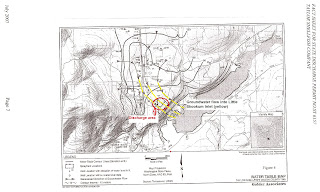Aerial Photograph of Taylor's
Processing Facility and Waste Discharge Areas
(click on photo to enlarge)
Comments are due by August 2, 2012
email to -
carey.cholski@ecy.wa.gov, referencing Permit ST 6157
Click here for Fact Sheet
Click here for Draft Permit
Taylor Shellfish has applied for a State Waste Discharge Permit for industrial waste water from their Shelton processing plant. Waste water volumes in 2011as high as
180,492 gallons per day were allowed under the previous permit which expired June 30 of this year. In April 2010, the monthly volume averaged
160,821 gallons per day. In July of 2007 the Department of Ecology stated the average over a seven year period was
150,000 gallons per day.
Despite Taylor Shellfish's claims of increasing demand; a pending permit for a mussel farm adding more than 1 million pounds to production; reports of increasing nitrogen in Puget Sound (shellfish contain ~30% seawater by volume); and the shellfish initiative potentially adding large numbers of acres for production, assumptions in the current
Draft Permit and
Fact Sheet assume no increase in volume.
Groundwater Flows Into
Little Skookum Inlet
(click to enlarge)
As described in the fact sheet, the upper layer of groundwater is separated from the deeper aquifer by a layer of clay like material. This results in the upper layer of soil becoming saturated during wet months which flows downgradient and exits into Little Skookum Inlet through adjacent streams and seeps. Downgradient seeps measured by Taylor indicate Nitrate/Nitrite levels which range from 2 mg/L to 5 mg/L, an order of magnitude higher than normal background levels, typically lower than 1mg/L. On
page 5 of the fact sheet Taylor reports background aquifer levels of nitrate to be .72 mg/L; Sodium to be 4.09 mg/L; total dissolved solids to be 77 mg/L; and chloride to be 4.1 mg/L. (Note: There appears to be no background levels established for the upper level of groundwater.)
From the chart above, it would appear that as saturation levels rise and downgradient flows increase during the wet winter months so too do the various levels of components within the waste water being discharged (sodium, nitrate, total dissolved solids, and chloride). All downgradient levels are well above the background levels submitted by Taylor (see page 5 of the
Fact Sheet). Taylor's report states the increased levels cannot be tied to their waste water discharge. What is the cause?
Why does the increase in nitrate/nitrite levels matter? In the water quality report recently submitted to the EPA the Department of Ecology noted one area in Totten Inlet which is considered to be "polluted" due to low dissolved oxygen levels not attributable to natural conditions: the mouth of Little Skookum Inlet.
Little Skookum Inlet
The Only Low Dissolved Oxygen Area
In Totten Inlet
While there are many causes of low dissolved oxygen, algae blooms feeding off of anthropogenic sources of nitrates and nitrites are felt to be a primary cause. While Taylor's mussel farm to the south may play a role, so too may Taylor's waste water discharge draining into Little Skookum Inlet. Either way, cumulative impacts from shellfish farming do have an impact on the water quality of Puget Sound which agencies need to consider in their permitting decisions.
(Note: The waste water discharge permit for Taylor Shellfish's Samish Bay facility which expired June 28, 2012, has avoided public comment through Ecology's administrative extension of the current permit for another five years.
See extension letter here.)
Comments are due by August 2, 2012
Comments should be sent to:
Carey Cholski
Department of Ecology
Southwest Regional Office
P.O. Box 47775
Olympia, WA 98504-7775
E-mail comments should be sent to carey.cholski@ecy.wa.gov







